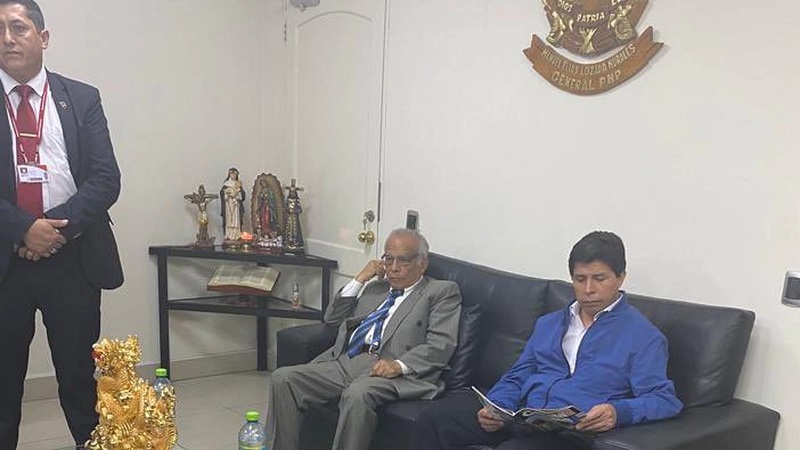Por Alberto Giovanelli
Pedro Castillo ha sido detenido tres horas después de anunciar la disolución del Congreso, decretar un Gobierno de excepción y la convocatoria a elecciones para renovar el Congreso y aprobar una nueva Constitución. Esta huida hacia adelante de un presidente asediado por una eterna crisis política desde que comenzó a gobernar hace poco más de un año y medio, había generado una enorme incertidumbre e incluso rechazo entre sus filas, que se sumaron al coro de la derecha y calificaron su decisión de “autogolpe de Estado”. Aparentemente su propia escolta de confianza termino entregándolo para que sea detenido.
La jugada final del maestro de escuela rural que se convirtió en la sorpresa en las pasadas elecciones acabó en una apuesta en solitario. Ante una nueva votación en marcha para destituirlo a través del Congreso, impulsada por la derecha, Castillo además de anunciar la disolución del Parlamento había declarado que reorganizaría el sistema de justicia, desde el Poder Judicial hasta otras instituciones como el Ministerio Público, el Tribunal Constitucional y la Junta Nacional de Justicia. Eso sí, aclaro y aseguro “que respetaría escrupulosamente el modelo económico”. Todo esto sucedió días después de la visita de una comitiva de alto nivel de la OEA, a petición del presidente, para evaluar sobre el terreno si en Perú estaba en peligro la democracia.
Desde que se conocieron sus intenciones, en un mensaje a la nación, las reacciones de rechazo fueron inmediatas, tanto desde la derecha como de la izquierda “caviar”, aduciendo el respeto al orden institucional de la constitución fujimorista del 93. El Tribunal Constitucional pidió a las Fuerzas Armadas “restablecer el orden”. Los congresistas habían decidido continuar la sesión a pesar del anuncio del cierre de puertas del aún presidente y aprobaron su destitución con 101 votos a favor, seis en contra y 10 abstenciones. Dina Boluarte, la actual vicepresidenta, asumió el cargo horas después y en su primera declaración llamo a conformar un Gobierno de Unidad Nacional ente todas las fuerzas políticas.

La caída de Castillo, trae a los peruanos los peores ecos del pasado. La incertidumbre en el país es total y nadie sabe qué puede suceder en las próximas horas.
Si bien es aventurado sacar conclusiones definitivas de todo este proceso, sí podemos afirmar, que no nos sorprende. Como lo hemos dicho en reiteradas oportunidades, la suerte de Castillo estaba jugada ya que desde que asumió su única intención fue lograr consensos con la derecha, que cada vez le exigió más concesiones, hasta lograr acorralarlo con varias exigencias, entre otras el abandono absoluto del programa de gobierno por el que fué votado. Esto lo fue desgastando aceleradamente entre la base social que lo llevo al gobierno y fortaleciendo las aspiraciones de los sectores más reaccionarios de la burguesía que trabajaron para destituirlo desde que llegó al gobierno.
Otra hubiera sido la historia si Castillo llamaba desde un primer momento a movilizarse hasta imponer la convocatoria a la Asamblea Constituyente que prometió y hubiera enfrentado a las corporaciones y sectores acomodados al mismo tiempo que proponía mejoras para las masas trabajadoras empobrecidas. Lamentablemente nada de esto sucedió. Castillo nunca fue un revolucionario y se adaptó desde un primer momento para congraciarse con el poder en las sombras del sector más rico del Perú, creyendo que así podría lograr que lo aceptaran. Y cuando se dio cuenta que estos habían logrado consenso para destituirlo ya era demasiado tarde para lograr apoyo social y político. En soledad termino protagonizando un sainete y finalmente fue detenido por unas fuerzas armadas en las que siempre confió.
No le reconocemos al corrupto Congreso peruano ninguna autoridad moral ni política para destituir o juzgar a Castillo y exigimos su inmediata libertad. Solo una Comisión Independiente de las organizaciones populares podría sancionar al ahora ex presidente. Reiteramos que cada vez que se habla de “legitimidad e institucionalidad” en el Perú, se toma como norma seguir la Constitución fujimorista del 93, que es impostergable derogar a través de una Asamblea Constituyente Libre y Soberana para que el pueblo en su conjunto debata como salir de la crisis y qué medidas tomar.
No será de la mano de la partidocracia tradicional que podremos salir de esta situación critica del capitalismo peruano. Estamos atentos a la evolución de la situación y cuál es la reacción de los trabajadores, los jóvenes y los movimientos sociales frente a la incertidumbre por la que estamos atravesando. Desde nuestra LIS no abandonaremos los esfuerzos para lograr la más absoluta unidad para imponer la movilización popular que encuentre una verdadera salida política, económica e institucional para cambiar de una vez y para siempre la estructura capitalista peruana que se ha demostrado una vez más, absolutamente incapaz de dar respuestas a las necesidades de nuestro pueblo.




